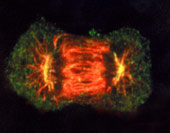 The key to treating cancer successfully is catching it as early as possible. This is particularly true in the case of bowel cancer, where around eight out of ten people will survive if their cancer is caught at an early stage, but sadly only about one in ten cancers are actually caught this early.
The key to treating cancer successfully is catching it as early as possible. This is particularly true in the case of bowel cancer, where around eight out of ten people will survive if their cancer is caught at an early stage, but sadly only about one in ten cancers are actually caught this early.
We already know from research that having a family history of bowel cancer increases the risk of developing the disease yourself - for example, just having one first degree relative with the disease can double your risk - that's a parent, sibling or child. And if they were diagnosed young, under the age of 45, this increases your own chances even more.
Previous research has suggested that offering colonoscopy screening people from families with a strong family history of bowel cancer could help to save lives. But it's not practically possible to screen everyone with one relative with the disease.
Now research from Cancer Research UK-funded scientists at the Institute of Cancer Research in Surrey has shown that a simple test could help to identify people with bowel cancer whose immediate relatives are at highest risk of developing the disease.
The scientists studied DNA in tumour samples taken from nearly 3,000 people with bowel cancer. They were looking for signs of microsatellite instability, which is basically messed-up DNA. This happens when there are faults in genes that repair DNA.
The researchers found that first degree relatives of patients whose tumours showed microsatellite instability were much more likely - up to twenty times more - to develop cancer themselves than relatives of patients whose tumours didn't show the instability, particularly if the patient developed cancer under the age of 45.
Overall, the scientists suggest that it would be worth screening people from the age of 25 from families where someone young develops bowel cancer with microsatellite instability. But people related to patients whose tumours don't have microsatellite instability wouldn't need screening from such a young age. This would help to target stretched screening resources to people at greatest risk, and also help to avoid having to screen people unnecessarily.










Comments
Add a comment